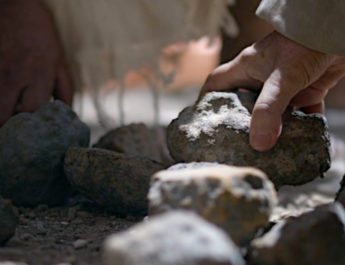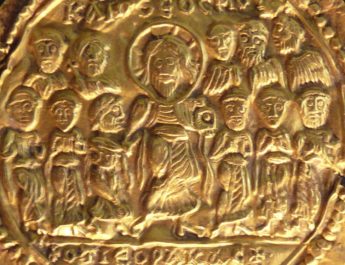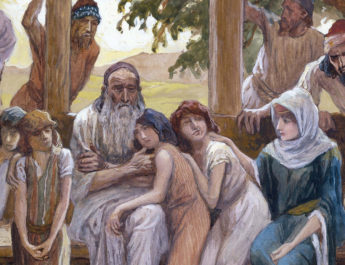Romans 8:12-17
Trinity Sunday B
12 So then, brothersA and sisters, we are obligated,B not to the flesh,C to liveD according to the flesh—
A “brothers” = adelphos. From a (with, community, fellowship) + delphus (womb). This is a brother in a literal or figurative sense. It is also used of another member of the Church.
B “obligated” = opheiletes. 7x in NT. From opheilo (to be indebted morally or legally – having an obligation one must meet; perhaps from the legal world, but then adopted in reference to morality; used to refer to humanity’s ethical responsibility); probably from ophelos (advantage, gain, profit); from ophello (heaped together, accumulate, increase). This is one who owes so it is a debtor or someone under obligation. Figuratively, it is a culprit, delinquent, or a sinner.
C “flesh” = sarx. May be from saroo (to sweep, cleanse by sweeping); from sairo (to brush off). This is flesh, the body, human nature, materiality, kindred. Flesh is not always evil in scripture (as when it refers to Jesus taking on a human body). However, it is generally used in a negative way for actions made selfishly and not through faith. This can mean animal flesh, i.e. meat, or refer to body in contrast to soul/spirit. Flesh can be a way of talking about how things or people are related or talking about human frailty (physical or moral).
D “live” = zao. This is to live literally or figuratively. It is used for life including the vitality of humans, plants, and animals – it is life physical and spiritual and life everlasting.
13 for if you live according to the flesh, you willE die,F but if by the SpiritG
E “will” = melo. Perhaps from melo (to think about something, take an interest, to pay attention; to care or worry about something). This is to be about to act, ready, intend, linger, delay. It is something that is sure to happen.
F “die” = apothnesko. From apo (from, away from) + thnesko (to die, be dead). This is to die off. It is death with an emphasis on the way that death separates. It can also mean to wither or decay.
G “Spirit” = Pneuma. From pneo (to blow, breathe, breathe hard). This is wind, breath, or ghost. A breeze or a blast or air, a breath. Figuratively used for a spirit, the human soul or part of us that is rational. It is also used supernaturally for angels, demons, God, and the Holy Spirit. This is where pneumonia comes from.
you put to deathH the deedsI of the body,J you will live.
H “put to death” = thanatoo. Related to “die” in v13. 11x in NT. From thanatos (death, whether literal or spiritual; also something fatal); from thnesko (see note F above). This is to kill in a literal or figurative sense – subdue, mortify, be apart from.
I “deeds” = praxis. 6x in NT. From prasso (to do or practice – something done on an on-going basis or by habit; to accomplish, attend, or commit). This is an action, deed, business, practice, or function. It implies ongoing activity or responsibility.
J “body” = soma. Perhaps from sozo (to save, heal, rescue); from sos (safe, well, rescued). This is body or flesh. It can be body in a literal or figurative sense (as the body of Christ). This is where the word “somatic” comes from.
14 For all who are ledK by the Spirit of GodL are childrenM of God. 15 For you did not receiveN a spiritO
K “led” = ago. This is lead, bring, carry, guide, drive, go.
L “God” = Theos. From Proto-Indo-European origins, meaning do, put, place. This is God or a god in general.
M “children” = huios. This is son, descendant – a son whether natural born or adopted. It can be used figuratively for other forms of kinship.
N “receive” = lambano. It does not refer to passive receiving of something, but active acceptance or taking of something whether it is offered or simply nearby. It focuses on individual decision and action.
O “spirit” = pneuma. Same as “Spirit” in v13. See note G above.
of slaveryP to fall back into fear,Q but you received a spirit of adoption.R
P “slavery” = douleia. 5x in NT. From douleo (to be a slave, be in bondage, to serve, obey, be devoted; it is to be a slave in a literal or figurative sense); from doulos (a servant or for a slave, enslaved; someone who belongs to someone else; could be voluntary (choosing to be enslaved to pay off debt) or involuntary (captured in war and enslaved)); from deo (to tie, bind, fasten, impel, compel; to declare something against the law or prohibited). This is slavery, bondage, or enslavement in a literal or figurative sense.
Q “fear” = phobos. From phebomai (to flee, withdraw, be put to flight). This is panic flight, fear, fear being caused, terror, alarm, that which causes fear, reverence, respect.
R “adoption” = huiothesia. Related to “children” in v14. 5x in NT. From huios (see note M above) + tithemi (to put, place, set, fix, establish in a literal or figurative sense; properly, this is placing something in a passive or horizontal position). This is making a son, adoption.
When we cry,S “Abba!T Father!”U
S “cry” = krazo. This is to cry out, scream, shriek. It is onomatopoeia for the sound of a raven’s call. Figuratively, this means crying out urgently without intelligible words to express something that is deeply felt.
T “Abba” = Abba. 3x in NT. From Aramaic ab (father); corresponding to Hebrew ab (father in a literal or figurative sense – grandfather, chief, ancestor). This is abba, which means father – not a diminutive daddy.
U “Father” = pater. This is father in a literal or figurative sense. Could be elder, senior, ancestor, originator, or patriarch.
16 it is that very Spirit bearing witness withV our spirit that we are childrenW of God, 17 and if children,X then heirs:Y
V “bearing witness with” = summartureo. 3x in NT. From sun (with, together with) + martureo (to bear witness, testify, give evidence; to testify in a literal or figurative sense); {from martus (a witness whether having heard or seen something; witness literally, judicially, or figuratively; by analogy, a martyr)}. This is to testify together with. It can also mean to corroborate.
W “children” = teknon. From tikto (to beget, bring forth, produce). This is a child, descendant, or inhabitant.
X “children” = teknon. Same as “children” in v16. See note W above.
Y “heirs” = kleronomos. 15x in NT. From kleros (lot, portion, heritage; that share assigned to you; also a lot used to determine something by fate, chance, or divine will); {perhaps from klero (casting a lot) or from klao (to break in pieces as one breaks bread)} + the same as nomos (what is assigned – usage, law, custom, principle; used for the law in general or of God’s law; sometimes used to refer to the first five books of the Bible or the entire Old Testament; also used to refer to theology or the practice and tradition of interpreting and implementing the law of God); {from nemo (to parcel out, assign)}}. This is heir, inheritor, or possessor – whether literal of figurative.
heirs of God andZ joint heirsAA with Christ,BB if we in fact suffer withCC him so that we may also be glorified withDD him.
Z {untranslated} = men. This is truly, indeed, even, in fact. Often, it is not translated, but used to emphasize affirmation.
AA “joint heirs” = sugkleronomos. Related to “heirs” in v17. 4x in NT. From sun (with, together with) + kleronomos (see note Y above). This is joint heir or participant.
BB “Christ” = Christos. From chrio (consecrate by anointing with oil; often done for prophets, priests, or kings). Literally, the anointed one, Christ. The Greek word for Messiah.
CC “suffer with” = sumpascho. 2x in NT. From sun (with, together) + pascho (to be acted on for good or ill; often used for negative treatment; properly, feeling strong emotions – especially suffering; can also be the ability to feel suffering). This is to suffer together or sympathize. It is sharing pain. It can refer to persecution in particular.
DD “be glorified with” = sundoxazo. 1x in NT. From sun (with, together with) + doxazo (to render or hold something as glorious, to glorify, honor, magnify, or celebrate; ascribe weight to something by recognizing its true value or essence); {from doxa (glory, opinion, praise, honor, renown; particularly used as a quality of God or manifestation of God – splendor); from dokeo (to have an opinion, seem, appear, suppose; a personal judgment; to think); from dokos (opinion)}. This is to glorify or praise together.
Image credit: “Adam and Eve” by Albert Kohler, circa 1920.




